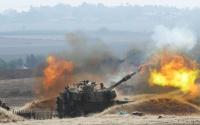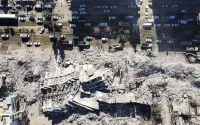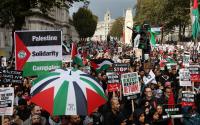Afghanistan needs a legitimate and accountable government
The Guardian, Tuesday November 13, 2001
The fall of Mazar to General Dostum's forces may be worth celebrating for the Americans, the Northern Alliance and perhaps the people of Mazar. But as an Afghan I can only groan at the possibility of disaster. I am afraid alliance military success will make a return to the political process less likely.
Whether the alliance has the capacity effectively to regain and properly govern the country is a separate issue. What worries me more are the dangers of the strategy of the "war on terrorism" in Afghanistan. As the military action enters its second month, the political process has been abandoned. Yet the problem of Afghanistan does not, and cannot, have a military solution. It will be a disaster if, at the end of the present "war", the chance of a solution is lost while Afghanistan is delivered again to the warlords.
As an Afghan, I could understand the rationale for US intervention, provided it was principled and motivated by goodwill towards the Afghans. But we were naive to invest hopes in the judgment of Bush and Blair. After a month's bombing of an already devastated country, the folly of the strategy makes me speechless.
We all know that terrorism is bred by conflict and complex emergencies. The multi-dimensional conflict in Afghanistan is the primary factor in the growth of terror cells and the drugs trade in the country. It is the lack of government, legitimate and accountable to the people, that allows foreign outcasts to operate in Afghanistan. The war on terrorism cannot be won unless the Afghan conflict ends and the country is restored to normality.
Military intervention should have been part of a political strategy to develop a broad-based governance. Before the bombing started, there were indications of a political process and a hope that a national leadership would emerge, perhaps under the auspices of the former king, Zahir Shah. Political elements were on the ascendant within the largely military alliance. There were opportunities that could have helped create a political process - former commanders assembling in Peshawar, moderate members of the Taliban, and the possibility of an anti-Taliban revolt by the people of Paktia and Khost in south-eastern Afghanistan.
However, ill-advised military strikes overtook the political process. The king receded; the alliance politicians retired behind their military commanders; no more anti-Taliban assemblies were organised; and there was no more threat of popular revolt. The military strategy of the coalition forces robbed Afghans of a rare opportunity to forge an enduring solution. Afghans have often been treated like this.
What did American bombs achieve? They hit a few deserted camps and empty government buildings, two Red Cross depots, a mine-clearing agency, a poor village, a hospital, a bus, children and the old. It is absurd to argue that the strategy was aimed at fragmenting the Taliban and accelerating the defection of their moderate elements. The opposite has been achieved.
Let us suppose a group of moderates were to desert. Where would they turn? The alliance is no reliable sanctuary (the existence of the alliance has reinforced the monolithic nature of the Taliban). A new alternative structure is what potential Taliban defectors, and elements of the alliance, need. It is this alternative which the US and Britain could have helped construct. Only the declaration of a new Afghan government, which is legitimate and inclusive, amounts to a real alternative.
The basic ingredients of such a government were there before the bombing. The former king still holds the key to a national leadership heading a broad-based government. Alliance political leaders repeatedly indicated their preference for a political arrangement over a military attack on Kabul, but bombing overwhelmed their voices. The political strategy is being marginalised.
It is vital that the political process is restarted. The alliance may well be allured with by military success, but it must not promise that there is more to gain on the battleground than through the political process. An interim broad-based government must be declared at the earliest opportunity. Perhaps Mazar, under its new rulers, is an opportunity. Rather than being a base for American forces, Mazar should be the first base for a newly declared Afghan government.
The dream of a government of national unity must materialise into a physical presence within the country. The structure and identity of the interim government will evolve over years. But the urgent demand is to present the people of Afghanistan with an alternative government preferable to the Taliban and more promising than the alliance.
· Jawed Ludin works for British Overseas NGOs for Development, London; he writes in a personal capacity






